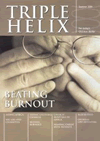Triple Helix: Is Gordon McFarlane right?
Peter Bewes: One can sympathise with many of his findings - they ring true. Yet many, to their financial disadvantage, waive their fees to the really needy.
Kevin Vaughan: The author's generalisation that 'church hospitals are serving only the middle income groups' needs to be strongly challenged. Recent experience (from Uganda and Malawi, for example) shows this to be far from true.
Triple Helix: Can Church hospitals give Christianity a bad name?
Janet Lefroy: The Church hospitals with which I worked were staffed by Christian Tanzanians who were trusted by their local community to offer qualitatively different care from the often inhumane and corrupt handling of the government health services -worth paying a small fee for.
Eldyrd Parry: It can be very difficult for a foreigner to understand how much a local community prizes its local hospital. Credibility and trust can be won if workers set as their overriding goal to be 'among them as those who serve'.
Triple Helix: Is charging fees as big a problem as Gordon McFarlane suggests?
Eldryd Parry: I have seen people who have walked for days to a remote rural polyclinic. They were prepared to pay, though it cost them dear, because at least this clinic had drugs and staff who did not demand a bribe. Simple people were being well served and they knew it.
Triple Helix: What is the case for the Church hospital versus the government one in Africa?
Kevin Vaughan: In Uganda, careful research by government departments has shown that church-based healthcare programmes provide 'more service per shilling' than government programmes and therefore the Government has recently increased its subsidy to church hospitals.
Triple Helix: Can Christian service balance out issues such as lack of state-of-the-art equipment and up-to-date facilities?
Eldryd Parry: Out-dated methods may take years to change, but the opportunity for outgiving service is all around.
Peter Bewes: I can witness to the great benefits that have been brought to that continent by Christian medical workers using their skills to improve not only the work in the Church-related hospitals, but by visits, lectures, practical teaching and sharing experiences, to the Government hospitals too.
Triple Helix: What's your view of Gordon McFarlane's suggestion that TEE and the like should be a greater priority?
Kevin Vaughan: While agreeing that TEE and other courses are greatly needed for building up national churches in Africa, let us also recognise that overseas healthcare personnel are likely to have an important role in assisting valuable church-based healthcare services in Africa for some considerable time to come and let us continue to look for innovative ways of providing such services.
Triple Helix: Do church facilities face temptations to corruption, nepotism and divert Christians from other key priorities?
Peter Bewes: Yes, it is true that a single church-related hospital may have a deleterious effect on the finances of the local church. The Christian has to realise that we live in a fallen world.
Kevin Vaughan: Many African countries are in considerable economic difficulty. Under these pressures, problems of nepotism and financial corruption for personal gain are common in secular and church life in Africa, but are no worse in healthcare than anywhere else.
Triple Helix: What of the future?
Peter Bewes: Christ sent us 'into the world' to serve Him and 'the world' does not limit its meaning to perfect institutions. Some of us have to make do with situations that involve financial stringency, sacrifice, facing corruption and even personal danger.
Janet Lefroy: The fatter parts of the Body of Christ in this world can well afford to continue to assist the thinner ones who are genuinely trying to do this. Why else did our Lord call us one body?
Kevin Vaughan: The past achievements and ongoing contributions of church-based healthcare in Africa are enormous and while recognising that some issues of genuine concern are raised, a positive attitude of rising to meet the challenges of the twenty-first century will achieve much. The past achievements and ongoing contributions of church-based healthcare in Africa are enormous and while recognising that some issues of genuine concern are raised, a positive attitude of rising to meet the challenges of the twenty-first century will achieve much.































